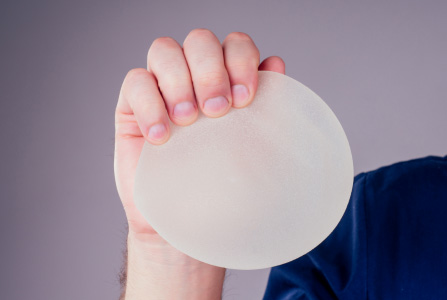
If you’re thinking about breast augmentation surgery in Dallas, you may wonder if you’ll need another surgery down the road to replace the implants. Or, will you need to have revision surgery to correct a problem?
The short answer is – possibly. But how long breast implants last depends on several things: your body and lifestyle, the plastic surgeon, types of breast implant, and just luck. Also, occasionally there are problems with implants that require breast implant revision surgery. The most common complications are:
- Capsular contracture: Due to capsular contracture scar tissue may form around the implant and squeezes it. The implant is removed and replaced.
- Rupture: The implant ruptures or leaks, but this rarely happens.
- Displacement: The implant moves. Your surgeon can reposition it with revision surgery, and replacement may not be needed.
Below is more information about the possibility of future procedures after your breast augmentation.
When Do Implants Need Replacing?
A common misunderstanding is that saline and silicone breast implants need to be replaced or altered every few years by your plastic surgeon. This misconception prevents some women from getting breast augmentation because they fear the costs and future procedures.
However, most breast implants last longer than many think, so there’s little reason to think that you’ll need to have breast revision surgery any time soon.
Many plastic surgeons say that you can expect to have one or perhaps two revision surgeries in your life if you get a breast augmentation. It’s not absolute, but it’s wise to be ready for the possibility.
As far as the typical lifespan of breast implants, there is no absolute rule. Some women find theirs last their entire lives, while others need a revision within seven to 10 years. Generally, most implants have a life of 10-20 years.
FDA has stated in recent years that 20% or so of women need repair or replacement within 10 years of the procedure.
You could go the rest of your life and never need another surgery, but nothing is certain.
How Often Do Implants Leak?
Implants rarely leak, but it is a possible complication. If it happens, it’s vital to get the implant replaced with revision surgery.
Saline Implants
If a saline implants leaks, you could notice that one breast is smaller than the other, and it doesn’t fill your bra like before. This can happen over a few days, weeks, or even months. It’s not painful because your body absorbs the saline, but you might notice a cooling sensation as it leaks.
Your plastic surgeon can evaluate the situation and confirm if a leak is present. They also may order a mammogram or MRI to confirm it.
If the leak is confirmed, it’s essential to have revision surgery quickly. If the implant leaks within 10 years, it could be covered by the manufacturer’s warranty.
Silicone Implants
With silicone implants, it’s harder to know if you have a leak or rupture. Silicone gel usually stays in place, and there isn’t a significant change in the size of the breast. However, you could notice a difference in breast shape; this is called a silent rupture.
If you suspect this has happened, have your surgeon examine you. A mammogram or MRI may be needed to confirm the leak. While there’s no evidence that silicone can hurt you, it’s crucial to have revision surgery as soon as possible.
It’s important to remember that saline or silicone implants rarely rupture or leak, but it’s appropriate to be aware of the possibility.
 Breast Implants And Aging
Breast Implants And Aging
Breast implants may last your entire life. However, some women need to replace them eventually because of aging’s effects. All breasts sag to some degree as women age. There also are problems with sun damage, tissue loss, and the effects of motherhood.
Over time, breasts can droop and change in size because of hormone fluctuations. Women who got their breast implants before they had children may notice that being pregnant and breastfeeding alter the appearance of the breast implants and need to be replaced.
Also, some patients return to their surgeon after having children because they want to restore their breasts to how they looked when they had their original implants.
Questions and Answers
What happens if you don’t replace breast implants?
Breast augmentation risks are issues like capsular contracture, ruptures, deflation, and rarely, breast implant illness (BII) or breast implant-associated lymphoma (BIA-ALCL).
How long can you go without replacing breast implants?
Breast implants typically provide a lifespan of at least 10 years post-surgery. Many last beyond 20 years, and some even surpass the 20-year mark.
How do I know when my breast implants need replacing?
- Dissatisfaction with the feel or appearance of the implants
- A desire to change the implants’ positioning
- Ruptures or leaks
- Capsular contracture
- Textured surface of current implants.
Can breast implants last 30 years?
Breast implants lack an official expiration date or shelf life. While the FDA doesn’t label them as lifetime devices, some women report using them for over 25 years, as long as they remain content with the results.
How do you break up scar tissue in breast implants?
To alleviate scar tissue around breast augmentation incisions, apart from surgical or therapeutic options, you can employ techniques like gentle massages and applying specific oils and creams to support healing.
Contact Us Today
If you ever have a sign of a problem with your breast implants, you should never ignore it. Talk to your plastic surgeon as soon as you can to get more information. If you have a problem, your surgeon can remove the implants, replace them, or correct the problem. Which is best for you depends on your preferences and specific case.
Now that you know about the chances of future procedures, you should have a better idea if you want to move forward with breast augmentation in Dallas Forth Worth area. Most women enjoy many years with no problems from their implants, so please bear that in mind as you consider your options.
Visit Dr. Raja Mohan. He is a board certified plastic surgeon and part of the American Society of Plastic Surgeons.
References
- Breast Implant Overview. (September 2020). Accessed at https://www.fda.gov/medical-devices/implants-and-prosthetics/breast-implants
- Breast Implant Revision. (n.d.) Accessed at https://www.plasticsurgery.org/cosmetic-procedures/breast-implant-revision